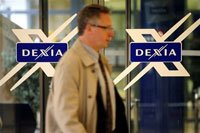Belgium’s second largest bank gets 6.4 billion euros of bailout
Dexia became the second Belgian bank this week to get a government and shareholder bailout Tuesday when Belgium, France and Luxembourg said they would inject almost EUR 6.4 billion (US$9.2 billion) to keep it afloat.

Dexia's CEO Axel Miller - who immediately stepped down - said the bank had no real option to asking for state help because "our feeling was clearly that this week is going to be very tense on the market and we might be ... one of the banks that might be put under pressure."
Dexia, a French-Belgian specialist in lending to local governments that ran up huge losses in its U.S. operations, closed nearly 30 percent lower Monday - triggering emergency talks with government officials.
This came barely two days after Belgium, the Netherlands and Luxembourg moved to save Belgian-Dutch bank Fortis on Sunday, pumping EUR 11.2 billion (US$16.4 billion) after its shares shrank by a fifth Friday. Traders saw the bank as overleveraged and lost confidence in its ability to pay for its expensive purchase of Dutch bank ABN Amro.
Markets clearly welcomed the bailout with Dexia's share price climbing 11 percent to EUR 8.03 in Paris trading and Fortis rising 10 percent in Amsterdam by noon local time on Tuesday.
Dexia said the extra money would allow it remain "one of the better capitalized banks in Europe" even if market volatility further devalues securities and other products it holds. It said it expects its equities portfolio to lose more value.
Belgian authorities and Belgian shareholders said in a statement that they would invest EUR 3 billion in the bank, while the French government - via its investment arm CDC which holds just over 10 percent in Dexia - will invest another EUR 3 billion. Luxembourg will add EUR 376 million.
For Dexia, the Belgian and French investments come in the form of a capital increase that will issue new shares at US$9.90 per share, while the Luxembourg government will get newly issued convertible bonds.
In return the bank promised to improve the way it is run - with Miller and chairman Pierre Richard saying they would resign and governments demanding "significantly" better corporate governance.
Miller said the company had been hit by "very nervous markets" and was partly a victim of Fortis' troubles that "drew attention to this corner of Europe."
"I don't know of many instances recently where investors have been found willing to put additional equity in banks," he told reporters on a conference call.
"We couldn't have foreseen just a week before last weekend that a major Belgian bank would be bailed out or that you'd have over the course of one single weekend signals that three, four, five banks across Europe were starting to have problems," he said.
Belgium is splitting its share of the bailout between the federal and regional governments, with EUR 1 billion (US$1.43 billion) each from the federal state, the three Belgian regions combined and shareholders Gemeentelijke Holding NV, Arcofin CV and Ethias.
The French government will invest EUR 1 billion, with its state investment arm Caisse des Depots et Consignations injecting EUR 2 billion. This will give France a 25 percent stake in Dexia, the Elysee palace said in a statement.
"This decision was taken to guarantee the continuation of financing for local French governments for whom Dexia Credit Local is the main lender, as well as to contribute to the security and stability of the French and European financial systems," the government said.
Dexia ran into trouble with its U.S. bond insurance unit FSA which was hit hard by the subprime housing crisis, which saw loans made to people with poor credit drop sharply in value on worries that borrowers could not make costly repayments. Holders of bonds based on those mortgages suffered heavy losses.
FSA quit asset-backed investments last month after setting aside US$936 million (EUR 639 million) in the second quarter and securing a US$5 billion (EUR 3.4 billion) unsecured line of credit from Dexia to cover potential losses that Dexia will now convert into a lower-risk credit facility.
Dexia will also inject up to US$500 million to cover any extra losses at FSA exceeding the US$316 million recognized at the end of June. These moves should allow the company to avoid selling off investments "at distressed prices" but would also cap Dexia's support and limit the amount of loss it is liable for.
Dexia was also hurt by the collapse of U.S. investment bank Lehman Brothers, saying it expects that to cause it EUR 350 million (US$512 million) in losses.
Subscribe to Pravda.Ru Telegram channel, Facebook, RSS!


